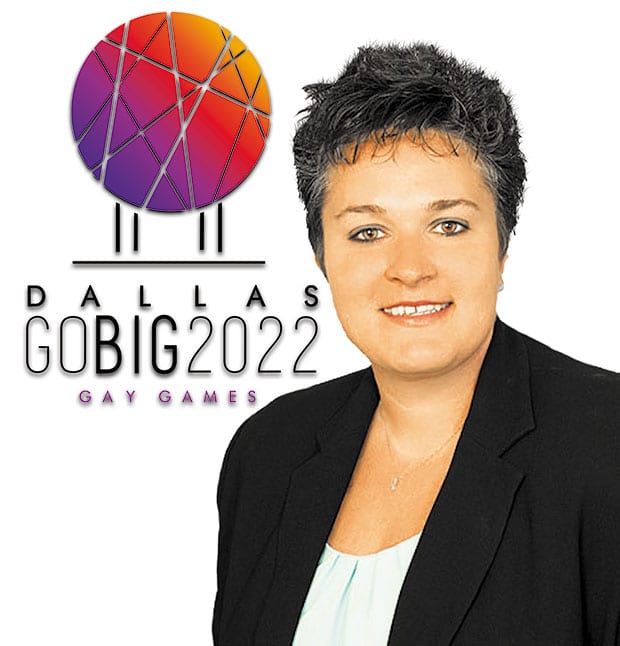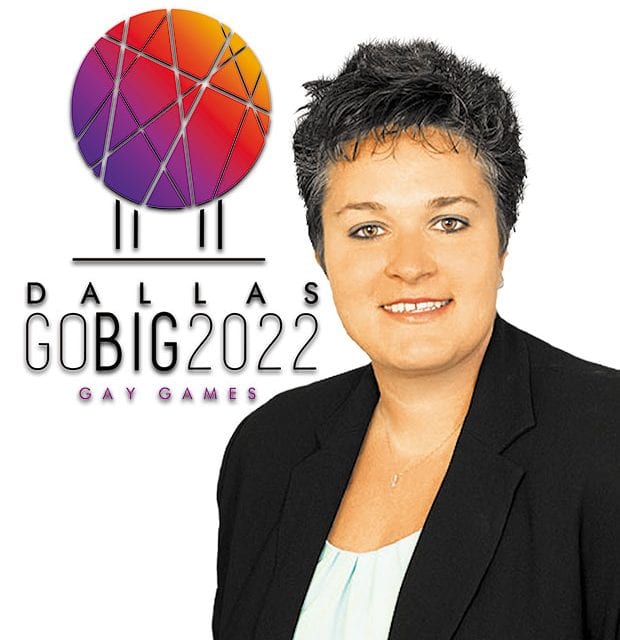Dallas is among 8 cities bidding to host the 2022 Gay Games, and aiming to make the final 3 cut on Feb. 28

DSC Executive Director Monica Paul
Tammye Nash | Managing Editor
In just 11 days, the Federation of Gay Games will narrow down the field of eight cities vying to host the 2022 Gay Games. And the Dallas Sports Commission is pulling for Big D to be one of the final three contenders announced on Feb. 28.
DSC revealed its intent to bid on the 2022 Gay Games last October, with openly gay Olympic gold medalist Greg Louganis making the announcement during the 2016 Black Tie Dinner. Video of that announcement was part of the Dallas committee’s presentation to the FGG a few weeks later in Sydney, Australia.
With anywhere from 10,000 to 15,000 competitors expected to attend the 2022 Gay Games, bringing with them about 25,000 partners, family members and friends, DSC Executive Director Monica Paul said the games would have an economic impact of about $60 million on Dallas and the Metroplex.
In addition, she continued, hosting the games would give Dallas international exposure as a destination for tourists from around the world. “We are already a destination city, but this could really change the perception of Dallas in terms of being a city with a very strong LGBT population.
We are very proud of that and we want to be known as an inclusive city,” she said. “People might not automatically think of ‘open-minded’ and ‘inclusive’ when they think of Texas. But we want them to know Dallas is open-minded and inclusive.”
The other cities that have submitted bids to host the games in five years are San Francisco (the city where the games were founded and where the federation is now based), Salt Lake City, Denver, Austin, Washington D.C., Hong Kong and Guadalajara. Paul said recently she thinks Dallas has a very good chance at making the final three.
“Everybody has their strengths and weaknesses,” Paul said of the eight contending cities. “You look at San Francisco, for example. That’s where the Gay Games originated. They have history there, so that might give them an advantage. But at the same time, San Francisco is a very expensive city.
The truth is, we haven’t really been comparing ourselves to the other cities. We have been focused on what we have to offer and making sure the committee sees those things,” she said. “Now, if we make it to the short list, then comes the analysis of the other cities’ bids and focus on highlighting our strengths as compared to the other two.”
Dallas, Paul continued, definitely has some advantages. For one, the Gay Games draw competitors and spectators from around the world, and Dallas has the advantage of having DFW International Airport handy, making travel easier for international athletes to get here.
Plus, Paul said, there’s also Dallas Love Field, located just minutes from the heart of the city and giving U.S. participants more options for travel.
“We have a lot of things on our side,” she said. “Look at the sports culture here in Dallas. Just speaking from that perspective, we have everything you need to host the games. And the Gay Games aren’t just about sports; there’s a very strong cultural aspect to them. And Dallas has that covered, too. We have one of the largest urban arts districts anywhere.”
There is no competition associated with the cultural component of the games, Paul said. “Instead, it is more exhibit based,” she explained. “We will have a film festival. The Turtle Creek Chorale and the Women’s Chorus of Dallas would play a big role in that part. The people in the Arts District and the city’s cultural groups will take a role in planning that side of the events.”
DART is another big component of Dallas’ Gay Games bid, offering participants “ease of transportation from the airports to the athletes’ village, and ease of travel to the sports venues and the cultural venues,” Paul said.
FGG committee members have asked about accessibility of the venues in relation to the athletes’ village — which, Paul said, would be constructed using money from sponsorships and from fundraising efforts — and about the venues in general.
“I’m very confident in the venues that we have put forth, and I know they will be great partners for us,” she said. “And we have had overwhelmingly positive response from Mayor Mike Rawlings and the majority of the Dallas City Council members have signed a letter supporting the bid.”
Dallas County Treasurer Pauline Medrano is supporting the effort, Sheriff Lupe Valdez, the Dallas County Commissioners, state Sen. Royce West and former U.S. Sen. Kay Bailey Hutchinson. The Dallas bid also has “a very solid financial model in place going into the process,” which gives Big D another advantage.
Noting that Texas’ western heritage “always pops up” when visitors think of coming to Dallas, so the local committee chose to include rodeo among the sports that would be included in the 2022 games if Dallas wins the bid to host.
“I think we’re the only U.S. city offering rodeo. Not including it would have been a huge missed opportunity,” Paul said. “We have a very passionate and very strong LGBT rodeo organization here in TGRA. In fact, we have a number of great LGBT sports organizations — softball, volleyball, bowling, rodeo — that would integral to our success. That is a definite strength for us.
“One unique component we would be adding is cheerleading. It’s always been on the cultural side of the games before, but in Dallas, cheerleading is part of our DNA. It just fit for us to include it in the competition,” Paul said.
Paul acknowledged that the conservative bent of the Texas Legislature’s current session does cast a bit of a shadow over Dallas’ bid for the 2022 games. Lt. Gov. Dan Patrick’s “bathroom bill” has prompted questions from the FGG committee making the decision, for example. But Paul pointed out that the measure is unpopular with many Texans, and that there is a big push — led by Dallas’ own convention and visitors bureau, now called Visit Dallas, and others in the state’s business community.
“The state’s political climate, the country’s political climate could change drastically between now and 2022,” she said.
She continued, “When you put it all together — two airports, a hub for American Airlines, the cultural aspects, the cost per participant — I think we have it all.
“I think we have a great opportunity here. We want to further understand the long-term vision of what the FGG wants, and we want to help them get there by hosting the games in 2022. The FGG’s mission is about inclusion and diversity, and it is hard to have an inclusive model when your city is too expensive. You want everybody to feel they have access.”
The motto for Visit Dallas is “Big things happen here,” Paul noted. And she wants to the Federation of Gay Games to know the city will go all out to welcome participants and make the 2022 games the best yet.
“We want to host the Gay Games, and we want it to be the best executed and best produced Gay Games they’ve ever seen,” she said. “That’s our theme: Go Big.”
This article appeared in the Dallas Voice print edition February, 17 2017.
















